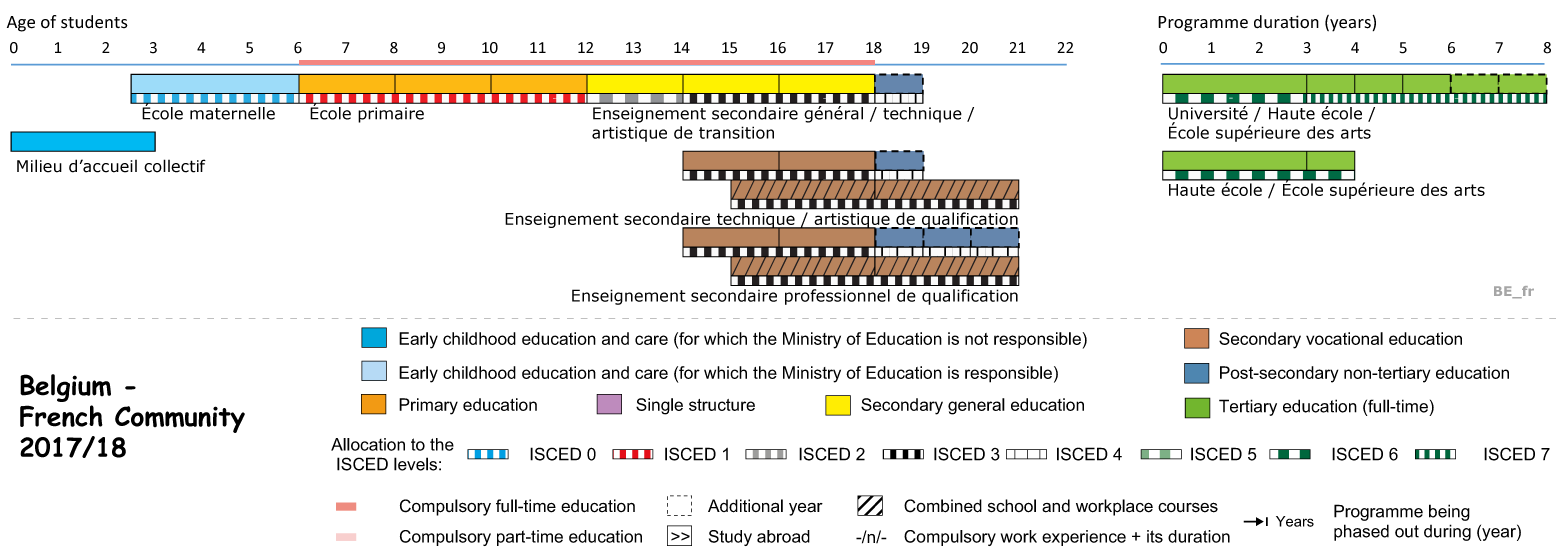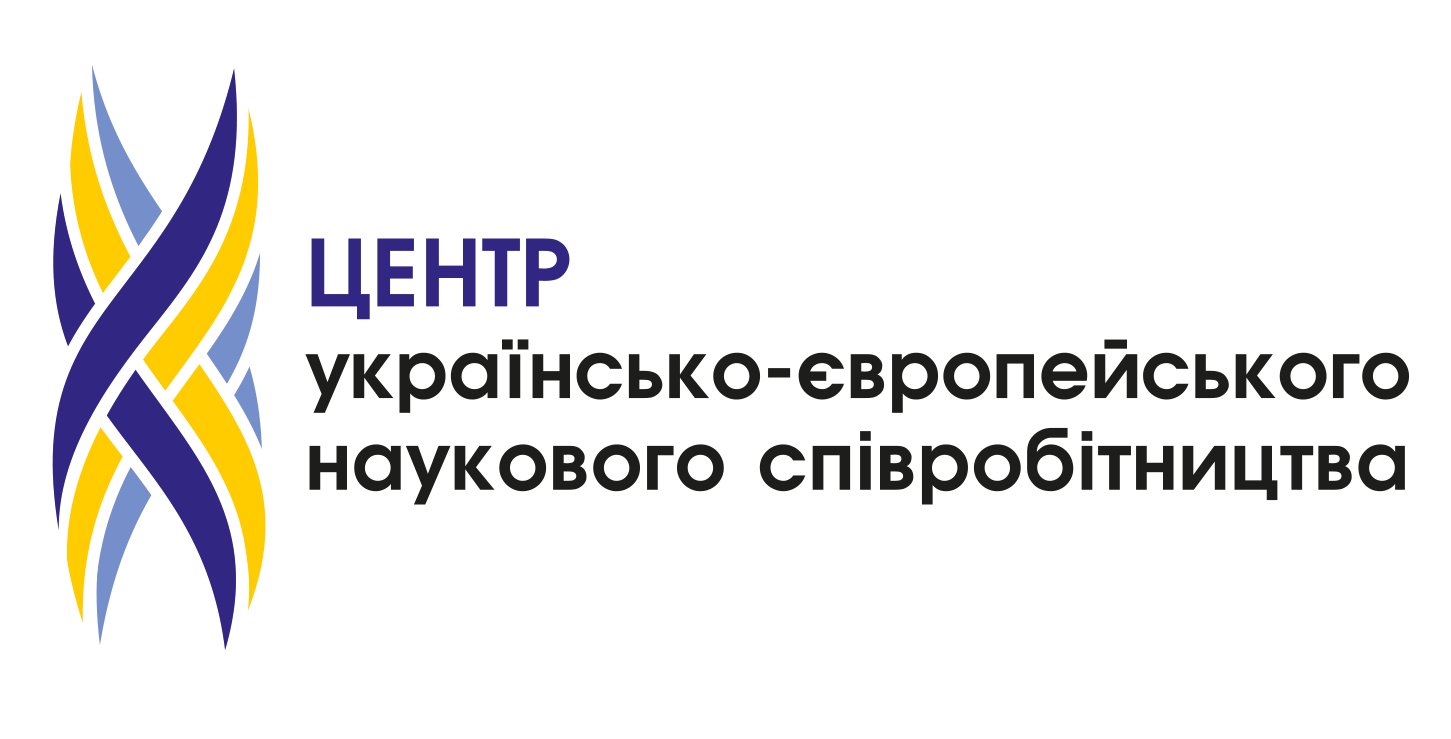 Key features of the education system
Key features of the education system
Educational competence
In Belgium the Communities are responsible for education, with the exception of three competences which remained a federal matter:
- the determination of the beginning and the end of compulsory education,
- the minimum requirements for the issuing of diplomas,
- the regulation of retirement for employees in the educational system.
Instruction in each community is provided in the language of the community in question.
The French Community of Belgium has competence in particular for cultural affairs and the use of languages, as well as education, childhood, youth, and research. The Government of the French Community has four ministers directly concerned by childcare and education: a Minister for Education (responsible for education starting from the pre-primary stage), a Minister for Early Childhood (among others), a Minister for Higher Education, Media and Scientific Research and a Minister for Social Advancement Education, Youth, Women’s Rights and Equal Opportunities. A fifth Minister is responsible for the budget, civil service and administrative simplification for the French Community. In the Government of the Walloon Region, a Minister is responsible for training (among other areas).
Freedom of education and school choice
In Belgium, freedom of education is a constitutional right. Every (legal) person may organise education and establish schools to that aim. The government has the duty to organise undenominational education (under certain conditions).
The constitution also guarantees a freedom of school choice for the parents. Parents and children must have access to a school of their choice within reasonable distance of their residence.
Home schooling
Education is compulsory from 6 until 18. Compulsory education in Belgium does not equal the duty to attend school. Parents may choose home schooling (e-learning) for their children.
E-learning offers interactive online course modules to prepare for certification exams.
The learner can register at any time of the year and choose the training project that interests him / her. He/she accesses his/her course modules at any time and anywhere via an online training platform. The modules contain varied interactive content (texts, images, soundtracks, videos …), self-directed exercises, homework and collaborative tools (chat, self-help forums …). The pace of learning is flexible. About 1.5 % of the children at primary or secondary level enroll in one or more training modules.
The cost of registration is € 25 per year. This registration fee allows access to the E-learning teaching platform, exchanges between learners and individual tutoring provided by a teacher with the required qualifications. Under certain conditions, exemptions from the registration fee are possible.
Educational networks
In Belgium, education is organised in various networks.
Education and training organised by the government is called official education. Education and training organised by a private person or organisation is known as free education (Government-aided private education).
A small number of schools are not recognised by the government. These private schools do not receive funding from the government.
In the French Community, there are three educational networks:
- Public education is the official education organised by the French Community. It is subject to respect the philosophical and religious views of all parents;
- Government-aided public education run by the municipal or provincial authorities;
- Government-aided private education is organised by a private person or organisation. The network consists primarily of catholic schools. Next to denominational schools it includes schools not linked to a religion, e.g. alternative schools (on the basis of the ideas of Freinet, Montessori or Steiner) which apply specific teaching methods.
In Belgium, the school boards of an educational network may join an umbrella organization. This association represents the school boards in government consultations and offers services to their schools such as drafting the curricula and timetables.
Pupil guidance centres
In Belgium, pupils, parents, teachers and school boards may address a pupil guidance centre for guidance, information or advice. The services of these centres are free and can be primarily situated within the following four domains:
- Learning and studying
- School career
- Preventive health care
- Socio-emotional development
Stages of the education system
Compulsory education
In order to guarantee the constitutional right to education, compulsory education has been introduced for all children residing in Belgium. Education is compulsory from 6 until 18.
A pupil must attend fulltime compulsory education until the age of 15. From 15 onwards students may engage in part-time schooling and opt for a structured learning path which combines part-time vocational education in an educational institution with part-time employment.
Primary education (enseignement fondamental)
In Belgium, pre-secondary education comprises both pre-school education and primary education.
Pre-school education is accessible for children from 2,5 to 6. Although it is not obligatory, almost all children participate in pre-primary education. Pre-school education supports the versatile formation of children and stimulates their cognitive, motor and affective development.
Primary education is targeted at children from 6 to 12 years old and comprises six subsequent school years. A child usually starts primary education when it is six years old and thus obliged to engage in education.
When successfully completing primary education children are granted a certificate.
Secondary education (enseignement secondaire)
In Belgium, secondary education is organised for youngsters from 12 to 18. Fulltime secondary education contains three stages and various types of education.
Each stage consists of two grades. In the third stage of vocational secondary education the successful completion of a third grade is necessary in order to obtain the certificate of upper secondary education. In the first stage of secondary education a common curriculum is offered. Pupils make a choice of study only at the start of the second stage.
From the second stage onwards four different types of education are offered.
In the French Community, education takes four different forms (general, technical, artistic and vocational) and consists of two streams (the transition stream and the qualification stream).
The transition stream prepares pupils for higher education whilst also offering opportunities to enter the labour market, whereas the qualification stream prepares pupils to enter the labour market while also enabling them to continue their studies in higher education. General education is a transition stream, whereas vocational education is a qualification stream. Technical education and artistic education can be organised in the transition stream or in the qualification stream.
Pupils choose a course of study within one of these types of education.
In Belgium, a certificate of upper secondary education grants unrestricted access to higher education.
Special needs education (enseignement spécialisé)
In Belgium, besides mainstream education there also exits special needs (pre)primary and secondary education. Special needs education is organized for children who need temporary or permanent specific support because of a physical or mental disability, serious behavioural or emotional problems or severe learning disabilities.
However, in July 2015, the Parliament of the French Community adopted by decree further steps with regard to guidance and support of integration for students from special need education into ordinary education. It is only if integration is not possible in ordinary education that the student is orientated to special needs education. In total permanent integration for each student in primary education and in the first two degrees of ordinary secondary education, 4 periods for supported students will be granted, provided by special needs education staff. Based on the means made available, 450 additional support periods may be granted on a proposal of the General Council of specialised education, particularly in the specialised education institutions organizing an adapted pedagogy or particular projects.
System of alternating learning and working
In Belgium, when a pupil is 15 or 16 years old (s)he may enter a system of alternating learning and working. All youngsters in part-time education are obliged to take part in learning and working for at least 28 hours a week. Part-time learning and working is organized in:
- a centre for part-time education;
- a centre for apprenticeships.
In the French Community, in a Centre for Dual Vocational Education (CEFA, Centre d’Enseignement et de Formation en Alternance), pupils take classes for 15 hours a week. These classes are supplemented with a working experience which matches the programme. Pupils can obtain the same certificates and qualifications as in ordinary full-time qualification-stream education, or lower levels of qualification via specific profiles.
In the French Community, apprenticeships are organised by IFAPME (the Walloon Institute of Dual Vocational Education and Training for Small and Medium-Sized Enterprises) and the SFPME (Small and Mid-Sized Companies Training Service in the Brussels-Capital Region). These two institutions organise dual vocational courses known as ‘apprenticeship contracts’ which satisfy the compulsory schooling requirement.
Higher education
In Belgium, higher education contains programmes which result in the degree of bachelor, master and doctor.
Also higher dual vocational education is part of the level of higher education.
Higher dual vocational education (enseignement supérieur en alternance)
In the French Community, higher dual vocational education is defined as “instruction in which the skills needed to obtain a degree from a higher education institution are partly acquired in the workplace and partly within this higher education institution.
In addition to masters in the dual system already in place, the Government of the French Community adopted on 30th June 2016 the decree which generalizes a dual teaching system at “Hautes Ecoles” and universities.
Bachelor (bachelier)
Bachelor programmes in Belgium may be both professionally oriented and academically oriented. Professionally oriented bachelor programmes are primarily aimed at practicing a profession and offer a direct access to the labour market. Academically oriented bachelor programmes focus on a broad academic education or an education in the arts. They aim at offering access to a master programme or to the labour market.
In general, a bachelor programme lasts 3 years to complete (180 credits).
Master
In Belgium, master programmes focus on advanced scientific or artistic knowledge or competences which are needed for the independent practice of science or arts, or for practicing a profession. They are rounded off by a master thesis.
Most master programmes last 2 years (120 credits).
Lifelong learning
Part-time education in the arts (enseignement artistique à horaire réduit)
In Belgium, part-time education in the arts is additional education and is targeted at both children, youngsters and adults. Participants may register on a voluntary base and pay enrolment fees. PEA aims at the artistic formation of children and adults and so contributes to their development of their personality.
Adult education
In Belgium, adult education is unrelated to the initial educational career. Course participants may obtain a recognized diploma, qualification or certificate in adult education.
In the French Community, adult education and training is mainly provided in two types of institutions : schools and training or education centres.
Structure of the national education system
Resource: https://eacea.ec.europa.eu/national-policies/eurydice/content/belgium-french-community_en









